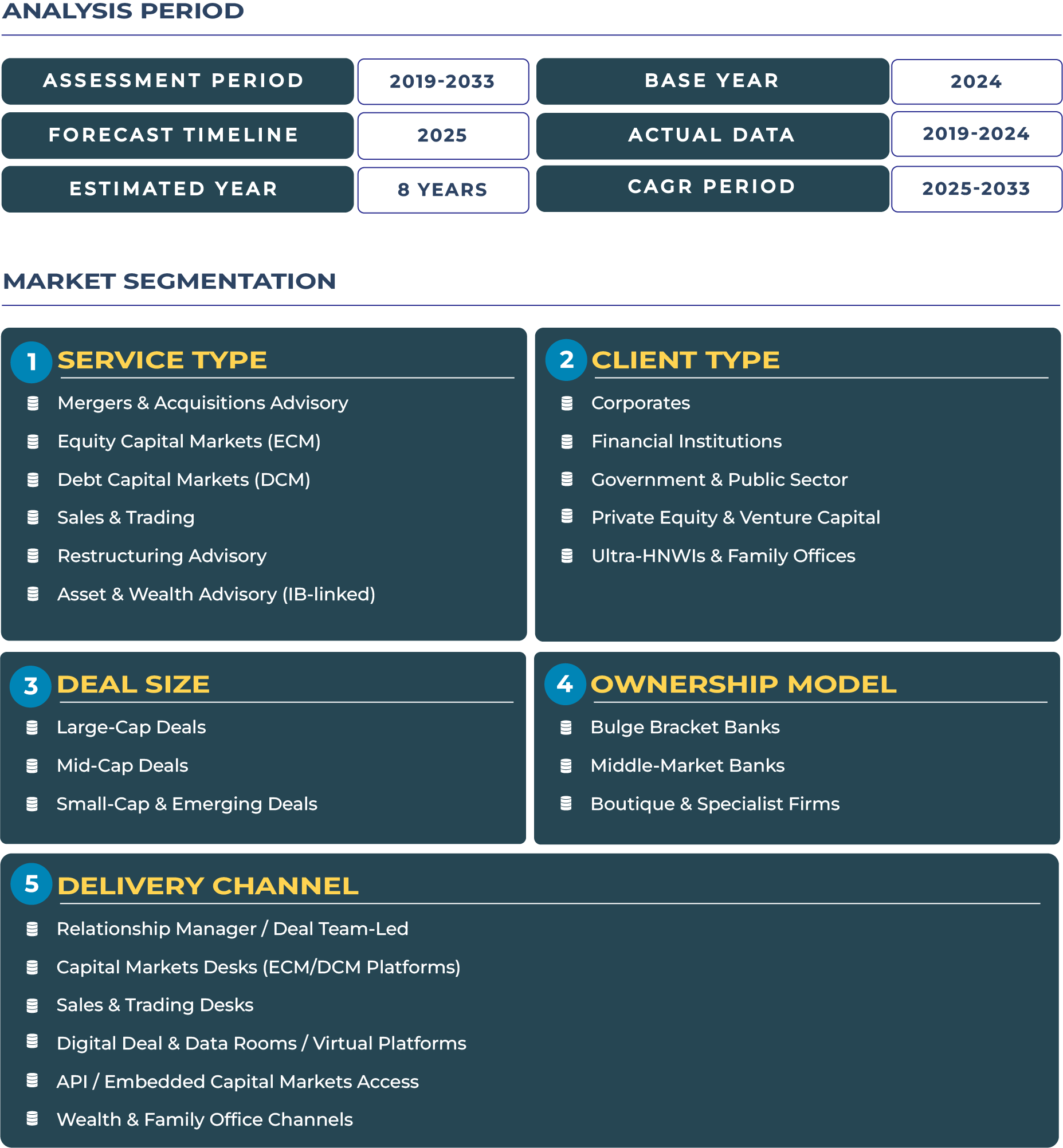India Investment Banking Market Outlook: Riding the Wave of Tech-Driven Growth and SME Empowerment
The India Investment Banking Market is entering a high-velocity growth cycle driven by booming fintech ecosystems, rising IPO volumes, and an explosion of SME financing needs. With a forecasted valuation of USD 18.4 billion in 2025 and an expected surge to USD 30.6 billion by 2033, India’s sector is projected to grow at a remarkable 6.5% CAGR over the 2025–2033 period. This surge is rooted in strong capitalization of domestic equity markets, a regulatory push for fintech and capital access, and unprecedented momentum in technology-led financial innovation.
Note:* The market size refers to the total revenue generated by banks through various services.
Tech & SME-Driven Corporate Advisory Fueling India Investment Banking Evolution
India investment banking landscape is being reshaped by the twin engines of technology adoption and SME growth. The proliferation of fintech platforms, powered by UPI, digital lending platforms, payment aggregators, and open banking APIs, is not only accelerating transactional volumes but also generating new advisory mandates and capital-raising needs. As SMEs scale and seek public listings or debt financing, investment banks and boutiques are stepping in to provide ECM and DCM services tailored for mid-market corporates. India’s digital infrastructure, backed by infrastructure projects and financial inclusion policies, is transforming how capital is raised, allocated, and managed. In 2024–25, Indian stock market ecosystem witnessed record IPO activity with over 318 IPOs raising approximately USD 20 billion. This environment is creating immense opportunity for Indian and global banks to participate in capital formation at every level, from pre-IPO advisory and underwriting to post-listing restructuring and strategic merger and acquisition.
Drivers & Restraints: What’s Propelling India Forward, and What’s Holding It Back
High IPO Momentum, Fintech Proliferation & SME Capital Needs Driving Growth
India’s IPO pipeline has grown dramatically. Fintech companies alone are preparing for major public offerings, and regulatory easing from SEBI is further stimulating listing activity. Simultaneously, the fintech industry’s transformation is fueling advisory demand: BCG reports that India’s fintech sector is attracting significant capital, with platforms evolving from payment infrastructure to full-stack advisory services. Digital lending platforms, embedded finance, and wealthtech are now creating a new class of transaction complexity that is well-suited to investment banking intervention. SMEs making the leap from private to public or raising growth capital are increasingly seeking help to navigate capital markets, liability structures, and financing vehicles, creating sustained demand across merger and acquisition, ECM, and DCM advisory pipelines.
Regulatory Complexity, Competition, and Infrastructure Challenges Restraining Pace
However, growth is not without its headwinds. India’s regulatory environment remains complex: multiple layers of compliance, disclosure obligations, and jurisdictional variance across states create friction for investment banking firms. SEBI’s evolving requirements and increased scrutiny, while ultimately beneficial to market integrity, add operational overhead and lengthen time-to-market for deals. Further, competition from domestic non-bank financial institutions (NBFCs), fintech firms, and digital lenders has compressed margins on traditional advisory revenue. Infrastructure shortfalls, particularly in Tier 2/3 cities, limit capital market access for many SMEs. Finally, macro-economic volatility and global headwinds stress cross-border transaction flow, constraining deal volume for large international mandates.
Trends & Opportunities: Digital Platforms, SME Advisory, and Capital Market Expansion
Increasing Digital Investment Platforms & Advisory Automation
One of the strongest trends redefining India investment banking sector is the rise of digital investment platforms. These platforms are integrating analytics, AI, and automated valuation engines to streamline IPO readiness, capital raising, and regulatory compliance. Banks are increasingly deploying APIs that allow clients to simulate capital structure scenarios, evaluate equity vs. debt decisions, and generate real-time reports, drastically reducing time and cost to execution. Moreover, fintech firms are partnering with investment banks to co-develop platforms that offer “pre-IPO readiness” scoring, regulatory checklists, and investor communication tools, enabling faster, more efficient capital raising for SMEs and growth companies alike.
SME Advisory and Corporate Restructuring as High-Value Opportunity Zones
The SME sector is at the heart of India’s economic transformation. As these businesses mature, many are tapping investment banks for advisory on capital structure optimization, debt refinancing, or merger and acquisition consolidation. Investment banking firms are expanding dedicated SME desks, offering services that include convertible debt structures, hybrid funding solutions, and scalable refinancing workflows. Furthermore, corporate restructuring, particularly in sectors hit by supply chain disruptions, is offering opportunities for advisory on refinancing, debt renegotiation, and balance sheet optimization. As SMEs increasingly aspire to cross-border growth, investment banks that can deliver global advisory services from India are becoming increasingly valuable.
Competitive Landscape: Domestic Champions and Global Players Carving Niche Spaces
The India investment banking market features a competitive mix of domestic leaders and global challengers. Firms such as ICICI Securities, Kotak Investment Banking, Axis Capital, and Edelweiss are deeply embedded in the local market. Global banks including Goldman Sachs, Morgan Stanley, and JPMorgan are also active, especially in large IPOs and cross-border mandates. Local boutiques are strengthening their presence by offering tech-enabled advisory platforms, SME advisory packages, and full-service offerings from pre-IPO advisory to post-listing restructuring. The Indian Venture & Alternative Capital Association (IVCA) also plays a critical role in organizing and advocating for mid-market advisory and PE/VC fundraising across India. In 2024–25, select Indian fintechs leveraged investment bank partnerships to prepare for IPOs, raising substantial capital. As digital platforms and capital markets continue to converge, advisory firms that integrate fintech workflows and market expertise are poised for strong growth in India investment banking ecosystem.







